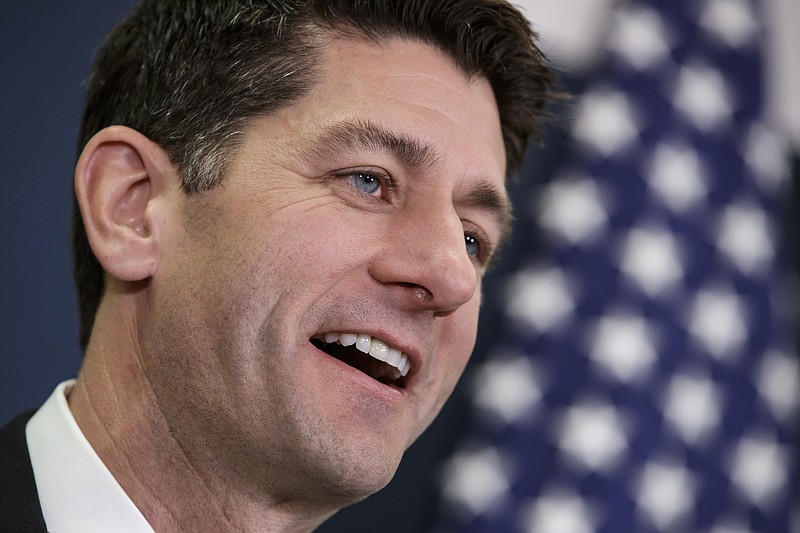In one fell swoop Wednesday, the Republican Congress answered the "Drill, Baby, Drill" calls of the 2008 presidential election, the so-called tea party members of 2010 who became energized by the adoption of the unpopular Affordable Care Act and the constant drumbeat of conservatives who demand that taxpayers should get to keep more of their money.
One might expect that such a trifecta would be celebrated as a once-in-a-lifetime, or at least once-in-a-generation, accomplishment, but Democrats and their national media partners tell us this tax reform measure is highly unpopular, will cause financial ruin in the country and will propel their party to majorities in the Senate and House in 2018.
All we can say with confidence is we won't know for several years how successful or unsuccessful this bill will be. Anyone who says they know already has some Washington, D.C., swamp land they'd be glad to sell you.
While we'll always want Americans to keep more of their paychecks, aspects of the Tax Cuts and Jobs Act worry us. On the surface, it adds $1.5 trillion to the country's debt over 10 years. That's both going the wrong way and not looking at the mandatory spending side of the budget, which soon must be dealt with or there will be no non-mandatory spending side to worry about.
The individual taxes also expire in 2026. While some Republicans promise they'll be made permanent when that time comes, that strikes us as a not-so-thoughtful gift to our 2026 selves or our heirs. We'd rather take less now - and in perpetuity - than think we'll suddenly have to pay more.
What we're not worried about is the rhetoric about this being a tax cut for the rich. A Congressional Budget Office chart listing the share of federal tax liability paid by household, by quintiles, shows the opposite being the trend. In 1979, the top fifth of the population paid 55.2 percent of federal taxes; in 2013, it paid 69 percent. In 1979, the bottom two fifths paid 2.2 and 7.4 percent, respectively; in 2013, they paid 0.8 percent and 3.9 percent.
Taking the specific bill into consideration, a table from the left-leaning Tax Policy Center, as pointed out by Kyle Wingfield in the Atlanta Journal-Constitution, spells it out in a different way. While the bottom four quintiles of income tax payers all will receive a larger tax cut than the percentage of income tax they pay, the top quintile - the rich - will receive a significantly smaller cut than the income tax it pays.
To say the American public has been spun on what the bill does and doesn't do is an understatement. After all, 80 percent of taxpayers are expected to see a cut in 2018, according to the Tax Policy Center.
Beyond the taxes, though, are the approval of drilling for oil in the so-called 1002 area of Alaska's Arctic National Wildlife Refuge (ANWR), which has been prohibited for 40 years, and the excising of the individual mandate portion of the Affordable Care Act (Obamacare), which forced Americans to buy health insurance or pay a fine.
Remember "Drill, Baby, Drill," the slogan used prominently by 2008 GOP vice-presidential nominee Gov. Sarah Palin? As gas prices crept toward $4 a gallon, tapping domestic sources of oil - such as in ANWR - rather than importing more foreign oil seemed prudent to most Americans.
Before and since, though, drilling for oil in the area has been cast as the rape of the region's 19,286,722 acres, an area the size of South Carolina. In actual fact, the footprint of the area to be affected is one-fifth the size of Dulles International Airport outside of Washington, D.C.
Since 2008, though, the U.S. has become less dependent on foreign oil because of the wider use of fracking, a method of extraction that uses a high-pressure water mixture on rock to release natural gas and oil. Although former President Barack Obama was highly opposed to fracking, it made drilling for ANWR's 10.7 million barrels of oil (7.7 billion in federally protected areas) less necessary at the time.
Even with passage of the bill, the necessity of environmental impact studies and the threat of lawsuits keep drilling from being right around the corner. But it's good to know it will be available.
The individual mandate in the 2010 health care legislation was an unconstitutional portion that was ruled constitutional by the U.S. Supreme Court in 2012 because Chief Justice John Roberts deemed it a tax.
While we support the repeal and replacement of the Affordable Care Act as a whole, the wrenching off of the individual mandate will do several things. It will end - after 2018 - fines collected for people who choose not to buy health insurance (which, in turn, helped pay the subsidies for those who did). The lack of subsidies, then, may cause insurance costs to rise.
It also is likely to cause some who bought insurance (as opposed to paying a fine) to drop their coverage. That should be their choice, but it probably will be more expensive when or if they ever wanted to get it back, especially if they are sick.
The prudent solution in this realm is for Republicans and Democrats to work together to craft a better health care bill. Since wishes are prevalent this time of year, we'll make that one of ours.
And on this day before Christmas, we'll hope the overall effect of the tax bill is every good thing its supporters say is possible and none of the bad ones its detractors believe will occur.
